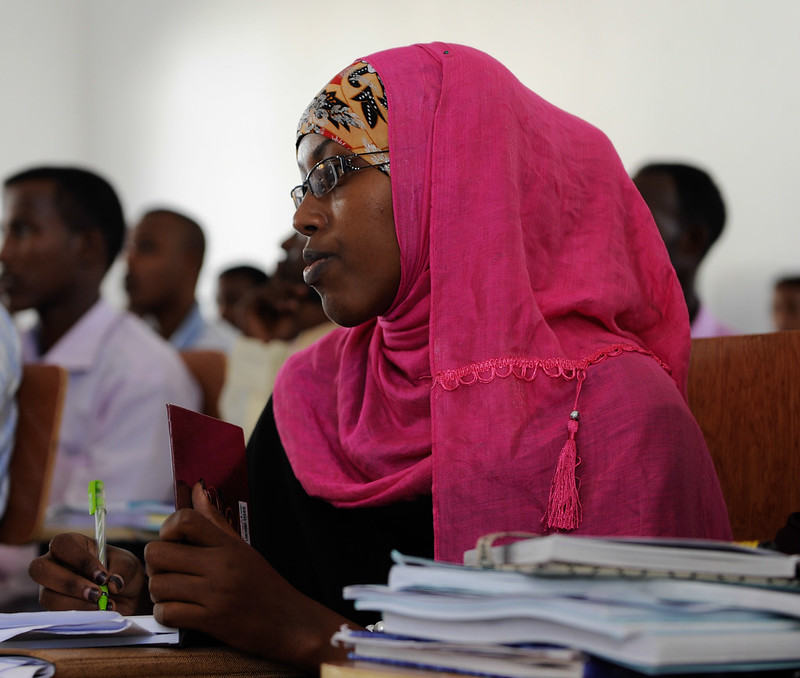War and conflict have a systemic impact on higher education. Universities are left damaged by attacks or occupation by armed groups. Staff and students are killed or face forced displacement, while institutions are weakened as post-conflict financial resources are allocated to basic services first. Although this is slowly changing, higher education systems are often not a priority during post-conflict recovery.
My recent report on research cooperation in Somalia finds that the system-wide damage to higher education caused by conflict can only be addressed through systems thinking and collective effort. This is even more relevant during the Covid-19 pandemic, which is challenging governments’ capabilities to respond through a whole of government approach. Lessons from Somalia could also be applied to other conflict-affected countries looking to rebuild their higher education systems.
The politics of higher education in Somalia
Higher education was in a state of near collapse following the Somali Civil War (1988-2004), and it’s still affected by insecurity in some parts of the country to this day. Yet, unusually for a conflict-affected country, the number of universities in Somalia has also boomed since the mid-2000s.
The exact number of universities in the country is unknown. Officially registered institutions with the Ministry of Education, Culture and Higher Education in Mogadishu number 76, while others point to more than 100. Our own study compiles an unofficial list of 126 private universities, far outstripping Somalia’s larger neighbours Kenya, which has 58, and Ethiopia with 36.
The fact that higher education is not regulated in Somalia is key to explaining this boom. The Higher Education Act designed to remedy this has been in stuck in Parliament for over two years. This means that local state governments overseeing higher education institutions do so without an overarching legal framework.
Our study finds that Somaliland is the only state-level government to pass a law which spells out the requirements for university registration. This near total absence of regulation means that it is relatively easy to open a ‘university,’ while national and local authorities have limited powers and capacity to monitor and enforce quality standards in teaching and research.
This has all taken place while the security situation remains very unstable in parts of the country. New parliamentary elections (the first in 50 years) were due to take place in 2020, but may be postponed due to the unfolding Covid-19 pandemic.
Only two out of Somalia’s six federal states (Somaliland and Puntland) have carried on with ambitious plans for higher education with support from development partners and INGOs. The system continues to face multiple, complex challenges.
The challenges facing Somalia’s higher education system
As Somalia’s higher education system re-emerged, some (mainly private) universities began investing in research and research training. These institutions face several challenges, including very few or no staff with PhDs (our study finds just 9% of academic staff hold PhDs), and research publications that fail to contribute to career progression.
Female researchers face heightened barriers linked to insecurity on campuses, while culturally a career in research is often deemed inappropriate for women.
Government agencies also fail to prioritise policy research, and as a result almost all research is driven by development partners.
This is also reflected in the main challenge facing the system – financial resources. Money is scarce and the sector is heavily dependent on international donors, who contributed 45% of the total federal budget in 2019.
‘Wicked hard’ problems and ways forward
The problems detailed above and the many others facing Somalia’s higher education system are considered ‘wicked hard’ problems. This means they are logistically complex, interlinked, politically contentious, and most have no known solution.
Single point solutions have limited impact on a system dogged by wicked hard problems. They provide temporary, lone answers in one area of the system that can cause problems to pop up or persist elsewhere in the system. Wicked problems require an approach that tests innovative solutions in parallel across different parts of the system and at different administrative levels.
NGOs like the Somali-Swedish Researchers’ Association organise student exchange programmes, research collaboration and mentoring support. They are worthwhile initiatives that have shown to improve the research skills of the students they involved. However, they address only a set of problems in the higher education system.
Such initiatives could be complemented by other experiments on interlinked problems elsewhere in the system. For example:
- Strengthening the capabilities of state-level Higher Education Commissions;
- Addressing regulatory inconsistencies on university accreditation and teaching quality;
- At the same time, overcoming political blockages to the Higher Education Act and encouraging policy-makers to use research to inform decisions.
While no single development partner has the resources to address all of the system’s many problems, development partners and the federal and state governments could discuss ways to shift from single projects to designing a portfolio of connected innovations and experiments that learn from each other and that together contribute to transform the higher education system in Somalia.
Just as war and conflict has a systemic impact on higher education, the effort to rebuild post-conflict higher education systems in Somalia (and elsewhere) requires the system-wide reboot students and academics deserve.


